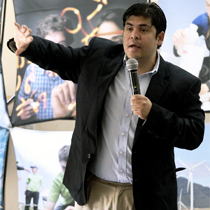Roberto Pacas - Fulbright NEXUS Scholar
Home Country: El Salvador
Grant Dates: 2012/2013
 Carlos Roberto Pacas is from San Salvador, El Salvador. As an environmental engineer, he has been researching water and air pollution for over ten years. He is currently the Director of the Institute for Energy Research at University Don Bosco in San Salvador. This research institute works to educate and implement renewable energy technologies and energy efficiency practices within industry, government, and schools. In 2011, he received a Master's degree in Environmental Engineering from the University of Cincinnati. His thesis is a statistical comparison between the gravimetric method and continuous method for measuring PM2.5 in Cincinnati, Ohio. He began air pollution research in 2005 with a project about Turbococina integration in rural communities. Better natural resource utilization and quality of life issues (such as indoor air quality and access to affordable fuel sources) for rural communities have remained a research interest. Developing better biomass efficiency is the next step to reducing deforestation and improving the quality of life for many communities that depend on biomass for fuel.
Carlos Roberto Pacas is from San Salvador, El Salvador. As an environmental engineer, he has been researching water and air pollution for over ten years. He is currently the Director of the Institute for Energy Research at University Don Bosco in San Salvador. This research institute works to educate and implement renewable energy technologies and energy efficiency practices within industry, government, and schools. In 2011, he received a Master's degree in Environmental Engineering from the University of Cincinnati. His thesis is a statistical comparison between the gravimetric method and continuous method for measuring PM2.5 in Cincinnati, Ohio. He began air pollution research in 2005 with a project about Turbococina integration in rural communities. Better natural resource utilization and quality of life issues (such as indoor air quality and access to affordable fuel sources) for rural communities have remained a research interest. Developing better biomass efficiency is the next step to reducing deforestation and improving the quality of life for many communities that depend on biomass for fuel.
His NEXUS research objectives are: building and testing a new oven-stove-cooling system; studying biomass combustion efficiency and data with simulation software; and conducting comparisons of different oven-stove designs and biomass materials in the lab to corroborate positive results in El Salvador conditions. Lab analysis will be done at the U.S. host institution. Upon returning to El Salvador, he will continue to improve his model and work to increase the combustion efficiency of existing stoves used in the communities-- thereby reducing PM2.5 and solid waste health problems, and using less fuel. He hopes to introduce the new prototype in rural areas of El Salvador and the United States. Developing and introducing a new prototype for an oven-stove-cooling system will create new entrepreneurship opportunities, such as bakeries and food preparation, for populations who don't have access to conventional fuel sources. It will also improve indoor air quality for the many women and children who suffer health problems from exposure to household air pollution. He hopes to contribute to the NEXUS community with this research, as well as through his experiences in solar PV implementation; university-business research relations; and with creating national energy efficiency standards and policies.

